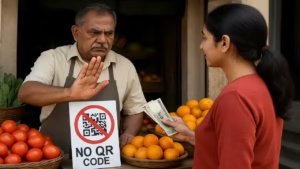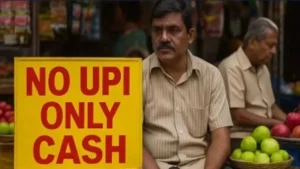
Imagine selling vegetables on a street corner for four years and then suddenly getting a tax notice asking you to pay Rs 29 lakh that’s exactly what happened to shankargouda hadimani Karnataka Vendor, a small vegetable seller from Haveri , Karnataka.
Karnataka Vendor, a small-time vegetable vendor near the Municipal High School grounds in Karnataka, has always found digital payments convenient. Most of Karnataka Vendor customers pay through UPI or other digital wallets — it’s quick, easy, and keeps him from handling large amounts of cash. But this digital trail, which should have worked in his favour, has now landed him in serious trouble.
Recently, Karnataka Vendor received a notice from the Goods and Services Tax (GST) department. The officials claimed he had made transactions worth Rs 1.63 crore over the past four years and demanded a tax payment of Rs 29 lakh. The problem? Fresh fruits and vegetables — his primary goods — are exempt from GST.
“GST is not charged on the sale of fresh fruits and vegetables unless they are packaged or labelled,” explains Harpreet Singh, Partner at Deloitte. However, the moment transactions go through digital channels or banks, they leave behind a clear record. When total digital transactions exceed a certain threshold, the tax department may initiate scrutiny, demanding proof of sales and detailed business records.
That’s where things get difficult for small vendors like Karnataka Vendor. These are people who live day to day — they earn daily, spend daily, and rarely maintain formal accounts or hire accountants. When asked to produce years’ worth of records, they simply can’t. And despite selling tax-exempt items, they can be caught in the system due to the volume of digital payments made to them.
Digital Trail Turns Into a Trap
Accounting and Business Support at Baker Tilly ASA India, notice that digital payments create a visible trail — one that’s easy for tax authorities to monitor. “While scrutiny is part of tax enforcement, issuing GST notices solely based on transaction volumes, especially to vendors selling exempted goods, is reckless and unjust,” he says.
In simple terms, because Karnataka Vendor accepted UPI payments, the authorities could track the money coming in. This visibility, which should ideally benefit honest taxpayers, instead became a liability. His digital payments, though related to tax-free sales, were flagged without basic due diligence.
“This isn’t just a technical error, “It reflects a deeper failure in the system — one where poor vendors, with no legal or financial backing, are penalised without proper investigation. That’s not enforcement. That’s exploitation.”
Digital Push Needs a Ground Reality Check(Karnataka Vendor)

Siddharth Surana, a GST consultant, says the case represents the evolving nature of India’s tax regime. “GST is becoming more data-driven and transparent, aiming to bring more people into the formal economy. UPI, a major success of Digital India, plays a key role in this transformation,” he says.
However, the same digital traceability is now triggering tax notices for many small vendors — even those not registered under GST. “These vendors lack the systems and knowledge to handle complex compliance. For them, transitioning from informal to formal economy is both financially and administratively burdensome,
While widening the tax base is an important goal, it’s clear that the system is not yet equipped to handle the realities faced by India’s small traders. Notices like the one received by Shankargouda can discourage vendors from accepting digital payments altogether.
A Threat to Cashless India?

This incident highlights a worrying trend. If vendors start avoiding UPI due to fear of unexpected tax notices, the government’s push for a cashless economy could suffer. Many small traders may prefer to revert to cash — even if it’s less convenient — to avoid getting trapped in compliance and documentation they don’t understand.
The situation may also inconvenience customers, especially those used to cashless convenience for small transactions. The digital ecosystem thrives on trust, and cases like this erode that trust.
Experts believe the solution lies in better policy design. “The GST registration thresholds need to be re-evaluated, “Equally important is educating small vendors about what digital payments mean for their tax responsibilities.”
Unless the government takes corrective steps, small businesses — the backbone of India’s economy — may retreat from the digital path. And that would be a significant setback to the dream of building a truly cashless India.
